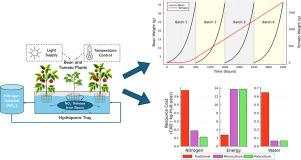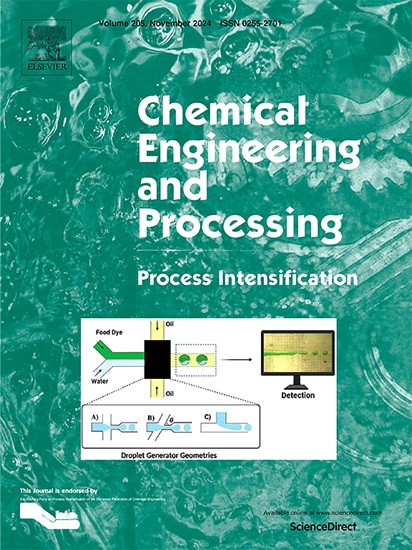Enhancing sustainable agriculture through optimized polyculture hydroponic operating strategies
IF 3.9
3区 工程技术
Q3 ENERGY & FUELS
Chemical Engineering and Processing - Process Intensification
Pub Date : 2025-07-24
DOI:10.1016/j.cep.2025.110446
引用次数: 0
Abstract
This study develops an optimization framework to determine optimal operating strategies in monoculture and polyculture hydroponic systems considering uncertainty and disturbances. A key novelty of this work is the development of a polyculture hydroponic model incorporating interspecies nutrient interactions and dynamic environmental factors into the optimization problem, offering insights for system management and sustainability. A mechanistic nutrient uptake and growth model captures system dynamics and improves resource efficiency while accounting for parameter uncertainty and external disturbances to enhance system resilience. A case study of hydroponic polyculture soybean and tomato plants demonstrates the benefits of this approach. Results show that hydroponic systems increase yield by over 60% compared to traditional farming. Compared to monoculture hydroponics, polyculture methods reduce nitrogen consumption by 40% and increase annual profit by 3.91% per kilogram of fruit. These findings highlight the importance of nitrogen supply management and demonstrate how computational optimization can advance sustainable agriculture.

通过优化混养水培经营策略促进可持续农业
本研究开发了一个优化框架,以确定考虑不确定性和干扰的单种和多种水培系统的最佳操作策略。这项工作的一个关键新颖之处在于开发了一种将种间营养相互作用和动态环境因素纳入优化问题的多耕水培模型,为系统管理和可持续性提供了见解。机械营养吸收和生长模型捕捉系统动态,提高资源效率,同时考虑参数不确定性和外部干扰,以增强系统弹性。以水培复合栽培大豆和番茄为例,证明了该方法的优越性。结果表明,水培系统比传统耕作增产60%以上。与单作水培相比,多作水培可减少40%的氮素消耗,每公斤果实年利润可提高3.91%。这些发现突出了氮供应管理的重要性,并展示了计算优化如何促进可持续农业。
本文章由计算机程序翻译,如有差异,请以英文原文为准。
求助全文
约1分钟内获得全文
求助全文
来源期刊
CiteScore
7.80
自引率
9.30%
发文量
408
审稿时长
49 days
期刊介绍:
Chemical Engineering and Processing: Process Intensification is intended for practicing researchers in industry and academia, working in the field of Process Engineering and related to the subject of Process Intensification.Articles published in the Journal demonstrate how novel discoveries, developments and theories in the field of Process Engineering and in particular Process Intensification may be used for analysis and design of innovative equipment and processing methods with substantially improved sustainability, efficiency and environmental performance.

 求助内容:
求助内容: 应助结果提醒方式:
应助结果提醒方式:


